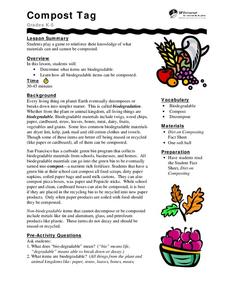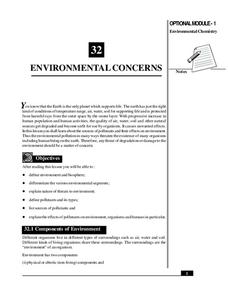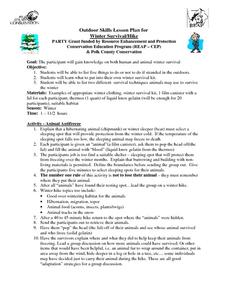North Clackamas Schools
Sorting Living and Nonliving Objects
Is a rock living? How about lima beans? You'll find everything you need for an interactive sorting activity exploring living and non-living things.
Kindergarten Kindergarten
Living and Non-Living Sort
What do an ice cream cone, bicycle, and alarm clock all have in common? That's exactly what young scientists will find out as sort these pictures and learn about the differences between living and non-living things.
Lerner Publishing
Living or Nonliving
It's alive! Or is it? Through a series of shared readings, whole class activities, and independent exercises children explore the difference between living and non-living things, creating a pair of printable books to demonstrate their...
National Park Service
Living & Non-Living Interactions
What better way to learn about ecosystems than by getting outside and observing them first hand? Accompanying a field trip to a local park or outdoor space, this series of collaborative activities engages children in learning about the...
Curated OER
Vocabulary Instructional Routine: Identify and Sort Common Objects into Categories
Kindergarteners build vocabulary by learning about categorization. They discuss the attributes of living and non-living things. As a class, they view and sort pictures into each category. They discuss the word category and what it means.
Alliance Theater
The Jungle Book Post-Show STEAM Lesson
An ecosystem is really just the flow of energy through many different living organisms. A study of Rudyard Kipling's The Jungle Book leads to an environmental science activity in which learners study how various factors can affect...
Pyro Innovations
Beach Exploration
Little ones will absolutely love this lesson. It's all about the beach and what they can find while sifting through the sand. A large bucket of sand filled with hidden items is brought into the classroom. Learners will discuss what kinds...
Cal Recycle
Conserving Natural Resources
Trying to plan an engaging elementary science unit on natural resources? Conserve your energy! This five-part series of lessons and hands-on activities has exactly what you need to teach young scholars about the importance of conservation.
Loudoun County Public Schools
Figurative Language Packet
A definitive resource for your figurative language unit includes several worksheets and activities to reinforce writing skills. It addresses poetic elements such as simile and metaphor, personification, hyperbole, and idioms, and...
California Academy of Science
Discovering Rainforest Locations
How many rainforests are there, where are they, and do global factors effect their locations? These are great questions that have great answers. Children in grades four through eight use several different maps to determine why...
SF Environment
Compost Tag
Composting is a great way to get children involved in recycling. First, they discuss how biodegradable products decompose to make compost. Then, they talk about what can and cannot be composted. They play a game similar to around the...
National Institute of Open Schooling
Environmental Concerns
Every year, more than 14 billion pounds of garbage is dumped into the oceans of the world, most of which is plastic and toxic to ocean life. Lesson 32 in the series of 36 focuses on environmental concerns, specifically pollution. Under...
Polk County Education
Winter Survival/Hike
Hibernation isn't just about staying fed, it's about staying warm. Young environmentalists explore the importance of staying warm in the wilderness with a short lesson about surviving in the wild. Using gelatin to represent warm-blooded...
Calvin Crest Outdoor School
Survival
Equip young campers with important survival knowledge with a set of engaging lessons. Teammates work together to complete three outdoor activities, which include building a shelter, starting a campfire, and finding directions in the...
Indian Land Tenure Foundation
Native Foods and Livelihoods
Introduce young scholars to the ways in which land and people have a relationship. They examine the types of food local tribes have traditionally consumed and ways in which the people and the land both benefited from the act of...
Other popular searches
- Non Living Things
- Non Living Organisms
- Non Living Things
- Laving and Non Living Things
- Lving and Non Living Things
















